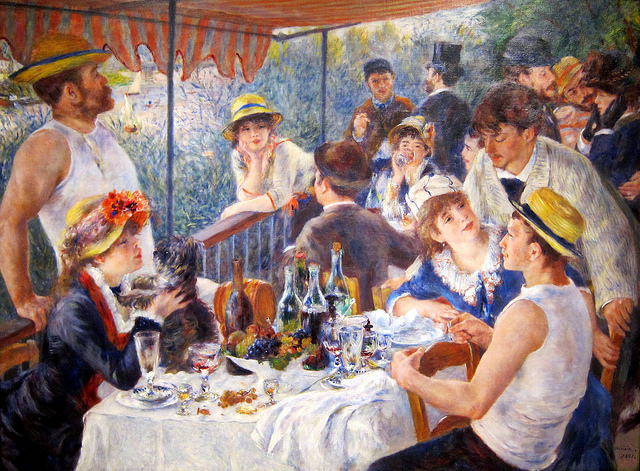
Just what is it about the stories we can’t stop telling?
In the film I Heart Huckabees, the “existential investigators” portrayed by Lily Tomlin and Dustin Hoffman play a revealing tape for the environmentalist-turned-corporate-sell-out character acted by Jude Law. It’s an audio recording of the many, many times they have observed him retelling the exact same story to different audiences.
The story he compulsively retells is about his celebrity rub-up with Shania Twain, and how he tricked her into eating a tuna sandwich even though (wait for it) she doesn’t like tuna. But the who, the what, the why, the when, the where and how are secondary. What matters is what the story says about him, what he’s trying to impress on others about his star-affiliated, clever, maverick self.
He’s not repeating the story just to entertain. He’s doing it for the qualities about himself he wants to be identified with. Listening to the tape, Jude Law’s character shifts in excruciating pain, pinned naked against his own insecurity and obvious hunger for praise.
The next time he’s asked to tell the tuna sandwich story, he can’t. Now he can see his retelling of the story for what it really is, a desperate grasping for an external validation of his worth. Now he feels like a silly, smiling puppet at the end of its strings. Is it even him? Is that all he is?
Chances are we’ve all heard somebody do this, and we’ve all done it. We’ve repeated a story not only for the drama it holds—though that always gets attention—but for the light it renders us in. A light, whether flattering or dis-empowering, that we wish to be bathed by because it affirms and validates something we have come to identify with or ache to feel identified with.

I used to relish the moments my previous partner repeated the travel story about how I once, unable to find a pen, spontaneously busted open and used a dried fig to write down a mechanic’s phone number as we hauled ass down a winding New Zealand road in a camper van, our power steering belt having jumped ship at the last turn. It dramatized our travel and ever so lightly painted me as a creative, quirky and girl-scout-badge-me-now-resourceful woman.
Jude’s tuna. My fig.
Wait, did I just repeat that story? Yes.
Well is that so bad? No!
Hey, aren’t I those things?
Sure. But the question is: Can I know myself to be those things and recognize them within myself, even if nobody else is waxing on about it? Even when I stay still, no new worldly adventures to tell? Can I sometimes not be all those things?
Most importantly, am I willing to be a creative, resourceful and intrepid woman in following the whispers of my own soul, in deeper and more challenging ways, even if it promises no recognition?
Is the story an ego snack? Am I a woman starving for a richer, more nourishing soul meal? Or is it just a laugh? Or both? If I’m honest with myself, I’ll know.
What is being revealed is often what is concealed within the story, if we listen closely—parts of us crying out to be recognized, acknowledged or healed from within.
When we gather in my women’s retreats, we explore the stories we create our lives through. The stories we repeat again and again to ourselves inside, often beneath our awareness, and their ability to hinder us from fully living our own fullest creative expression.
At one point, we pause to consider how some memories chase us. They’ve packed a bag and decided to come with you on the retreat because truth is they come with you everywhere, even when you forget them. Memories that for whatever reason stick out like uneven pages in the chapters of your life, poking at you, some so subtle you can’t reckon why. Why are they sticking around? What are they asking to reveal?
When a memory is stuck, whether playing outside or inside, whether trumpet loud or in muted sepia tones, it’s often a clue to a narrative at play in our lives. Too often, a narrative that holds us back from fully living it, a story we are repeating again and again that we are caught in, a deal we’ve made against ourselves.
The rub we feel is our heart nudging us to notice that we’ve become a little caged inside here.
In our women’s circle, we share a memory that’s stuck with us—the who, what, how, when, where and all of the feelings. We pick one, a stepping stone maybe, that we sense still has a hold on us. We write and share it (if we wish) as we experienced it, as we remember it, as we felt it. We share in vulnerability and openness to admit and feel our pain.
And, we’re also looking to find something. We recognize that we’re holding a clue.
We’re looking to become aware of what interpretation about ourselves we’ve imprinted upon that memory, either back in the moment or because we’ve sneakily since then retrofit it to support a running narrative. We’re looking to recognize if there’s an interpretive lens we formed about ourselves or others we’ve linked to this memory that’s affecting more than our vision.
We are looking for the “memo” hiding in the “memo”ry. Take, for example, “nobody appreciates my art.” A little script note that we narrate our lives through that might be binding us to play a particular, limiting role (the unappreciated) and other rotating characters in our lives to play the prescriptive supporting roles (the non-appreciative).
Are we limiting ourselves to the character of the girl whose gifts are not appreciated, who maybe stopped creating? Have we become comfortably, if painfully, attached to being her?
Are we selectively perceiving or filtering past, present and future experiences as non-appreciative to keep ourselves bound to retelling and reliving this stuck story of not being appreciated, of our art being worthless?
If we open the sides of our interpretation just a little bit, something else begins to come in. Some other angles of perspective. We begin to see things that we were blind to.
Are we throwing the word “fluke” at evidence to the contrary of our narrative, moments when we have received appreciation and support and encouragement for our art? Are we self-sabotaging by not bringing support into our lives now or by not creating art at all?
Most importantly, are we failing to appreciate our own gifts and refusing to grow by owning them? Is fear chasing its tail inside of us in the form of this narrative we are holding tightly onto?
Could we do something, right now, to begin a narrative that our art is appreciated? If we’re honest, do we already have one example, or more, of how it is? We often do. Can we start with appreciating and valuing it ourselves, and then define what’s important from that perspective?
Reclaiming our story usually means being willing to admit areas in which we have betrayed ourselves, often ways in which we have denied our own deepest desires or fullest expression.
But like Jude, once we see a narrative for what it is, we have a pull inside of us that no longer wants to be caught on the end of its strings, forced to re-enact the same story.
We find we’re soul hungry, and somehow those tuna sandwich stories just aren’t enough. Fear and all, we expand the narrative to something that nourishes.
~
Author: Aimee Hansen
Editor: Alli Sarazen
Photo: Frederic Glorieux/Flickr & NCinDC/Flickr


Read 3 comments and reply